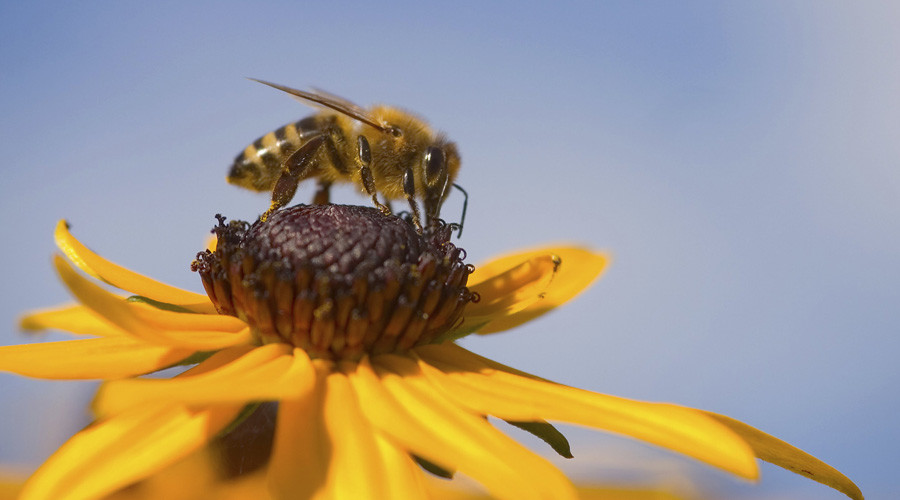To Bee, or Not To Bee: Will Bumblebees Become Extinct?
ENVIRONMENT, 13 Feb 2017
Russia Today – TRANSCEND Media Service
8 Feb 2017 – Widely used pesticides and insecticides, climate change, and introduced species are factors for bumblebees as well as other species of bees being endangered, Mark Floegel, beekeeper & Greenpeace research director, told RT America’s Anya Parampil.
For the first time bumblebees are on the endangered species list. Beekeepers have been complaining about bees dying en-mass. Why is this happening? Why is the bumblebee is so important and how significant it for human survival?
Mark Floegel explains:
“Bumblebees like all bees are pollinators. We need bees and other pollinators like butterflies and birds to get germplasm – allowing plants to have sex with each other, so male and female plants can cross pollinate… About a third of the fruits we eat in the US are pollinated by honeybees – the bees that are taken around by beekeepers who do that. But there are many other pollinators, as well, including bumblebees.”
The researcher explains honey bees “give us honey and bees that some beekeepers bring around to pollinate crops – like oranges, almonds, blueberries.” Bumblebees are wild; he told RT America’s Anya Parampil.
“There are 20, 000 species of bees, but they are all endangered by very similar things. One is climate change. We’re moving bees out of their range; we’re making their seasons very irregular,” Floegel said.
Another danger comes from introduced species “that have come into this country, the way that other species that come into this country the way other invasive species have come into this country” and they are attacking the American bees.
Widely used pesticides and insecticides are making things worse. For instance, neonicotinoid – is an insecticide, so it does kill insects, including bees.
“It is a pernicious insecticide, which we’re trying to get EPA [Environmental Protection Agency] to ban for the health of bees and therefore for the help of our crops,” Floegel said.
Commenting on whether this recently reported die-off is irreversible, the researcher suggested: “we need to increase good, healthy food for bees.”
“In fact, the bees that live in my neighborhood, that live in my backyard – all my neighbors contribute to helping out by planting bee-friendly plants in their yards. So my bees have plenty of good, healthy food because they don’t use pesticides. I pay them back by giving them honey,” he said.
httpv://www.youtube.com/watch?v=1VthV2V31Y4
DISCLAIMER: The statements, views and opinions expressed in pieces republished here are solely those of the authors and do not necessarily represent those of TMS. In accordance with title 17 U.S.C. section 107, this material is distributed without profit to those who have expressed a prior interest in receiving the included information for research and educational purposes. TMS has no affiliation whatsoever with the originator of this article nor is TMS endorsed or sponsored by the originator. “GO TO ORIGINAL” links are provided as a convenience to our readers and allow for verification of authenticity. However, as originating pages are often updated by their originating host sites, the versions posted may not match the versions our readers view when clicking the “GO TO ORIGINAL” links. This site contains copyrighted material the use of which has not always been specifically authorized by the copyright owner. We are making such material available in our efforts to advance understanding of environmental, political, human rights, economic, democracy, scientific, and social justice issues, etc. We believe this constitutes a ‘fair use’ of any such copyrighted material as provided for in section 107 of the US Copyright Law. In accordance with Title 17 U.S.C. Section 107, the material on this site is distributed without profit to those who have expressed a prior interest in receiving the included information for research and educational purposes. For more information go to: http://www.law.cornell.edu/uscode/17/107.shtml. If you wish to use copyrighted material from this site for purposes of your own that go beyond ‘fair use’, you must obtain permission from the copyright owner.
